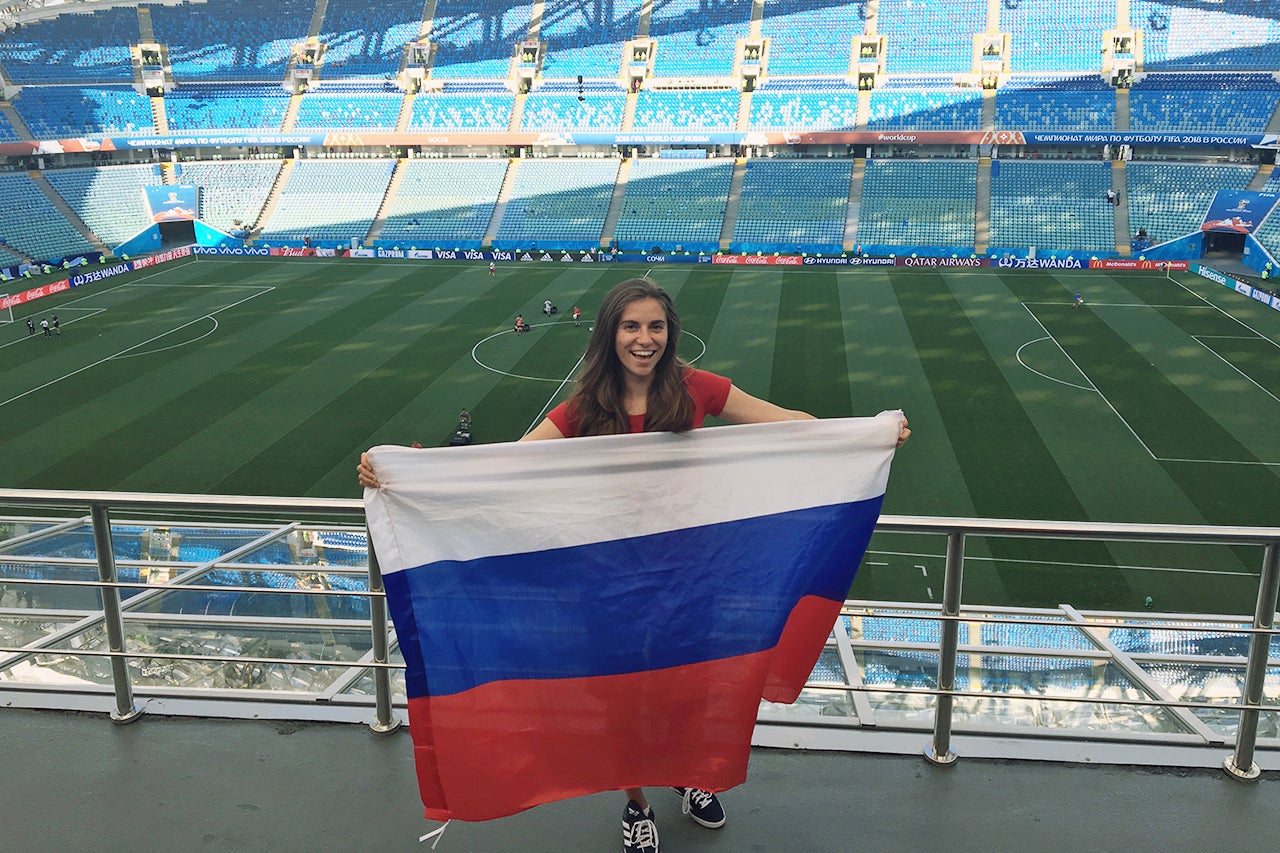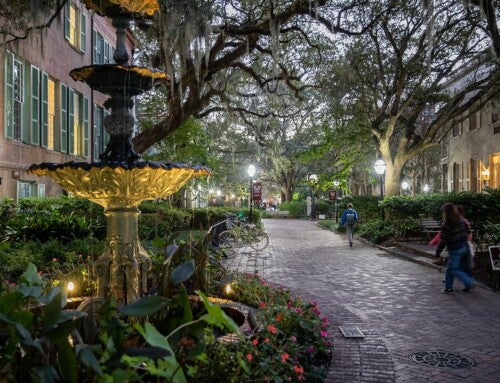The FIFA World Cup only comes around every four years – so being a part of the international soccer competition is, without question, the chance of a lifetime. That’s why Deniz Houston ’16 jumped at the opportunity to spend five weeks working at the FIFA World Cup Russia in Sochi this summer.
As a media operations volunteer on FIFA’s Media Tribune team, this international studies major who double-minored in political science and Russian Studies at the College, got to be front and center at the games – and got to use her Russian language skills, as well.
“This is the first time I am able to apply my language skills and knowledge that I learned from the College,” says the half-Turkish, German-born Houston, who studied abroad three times as an undergraduate and has spent the past year in Germany.
Now that Houston is stateside, The College Today was able to catch up with her to learn more about her experience at the 2018 World Cup and how the College of Charleston helped her get there.
What’s it like being part of the biggest sports event in the world?
It is incredible. I feel like it is one thing to attend the event and another to help it happen. Working for the World Cup is not all fun and games – there are plenty of positions that do not get you close to the games or any of the players, but it’s a great feeling because you are helping not just one cause or one country, you’re helping bring people together through sports, regardless of where they come from.
That is what was so great about volunteering for FIFA, too. Although they are not paying their 1,500 volunteers, they are giving young people who otherwise would not have a chance to be a part of something global the opportunity to work together and help bring the largest international event in the world to a small city in Russia.
What were your main responsibilities as a media/press volunteer?
I was working on the Media Tribune team, and my main duty was facilitating communication between FIFA and the journalists that would come to our stadium. There were several positions to choose from – some that would get us closer to the players and others that would get us closer to the game. I chose to work in a position where I was far from the players but close to the journalists and the game. I believe that the position I chose was the best of both worlds. Of course I wanted to be close to the game, but to me it was more important to interact with the journalists from all over the world, observe cultural differences and see how 300 people would work to deliver news on the same event.
Do you consider yourself a soccer fan – and, if so, do you have a favorite team?
I am a soccer fan once every four years. What I really love is the World Cup because it is one of the largest events in the world and can bring so many different people and backgrounds and cultures together. I love the World Cup and I love supporting national teams, but my favorite team is my 4-year-old niece’s soccer team.
How did the big upsets change the general energy at the games, and what was the mood like when Russia lost?
The biggest upset that affected Sochi’s atmosphere was Argentina losing. Many Argentina fans expected to see Messi in the quarterfinal; instead they got to see the Russia vs. Croatia game, and that was the most intense match we saw in Sochi. Our stadium held 45,000 seats. A total of 5,000 were sold to Croatia fans, 38,000 were sold to Russians, and there were about 2,000 disappointed Argentina fans who thought they would be seeing Messi.
The Russian team tied with Croatia with seven minutes left, and it was one of the most intense feelings ever. Although Russia lost, the people were proud; the Russian national team has never made it to the quarterfinals of the World Cup. So, even though the Russians were sad, the pride that they felt in their team and their country outweighed the sadness.
What is the attitude toward Americans in Russia right now?
Being an American in Russia right now is something special and different than I thought it would be. I usually introduce myself as Turkish-American, but people only hear the American part, and I usually receive a giggle or a gasp.
Many people I worked with have never met an American before. It was very nice, no one wanted to talk about politics, they were very interested in U.S. culture like our university system, concerts, volunteering and what life was like as a young professional in the U.S. Many people asked me what Americans thought about Russia or how U.S. media described Russia and if it was as negative as the way Russian media describes the U.S.
RELATED: Learn more about Deniz Houston and the time she has spent traveling abroad.
How did being a Russian Studies minor at the College help you through this experience?
The Russian Studies program at the College was absolutely amazing. They helped me develop an interest in Russia that I knew I could not satisfy with a weeklong trip or short visit. I knew that I wanted to go to Russia, and I knew that I really wanted to meet Russian people and see what their lifestyle was like. That is why I chose to go with a large international organization like FIFA. It gave me the confidence to travel to Russia alone – but, because it wasn’t an organized program intended for foreigners to come and visit Russia, I feel like I was able to experience Russian culture on a very intimate level.
But on a more logistical level, I was essentially awarded this position because of my Russian language skills, which I gained while studying at the College. So, without the College of Charleston, I would not have been given this opportunity. I have the Russian and German Studies department to thank for helping me get to where I am.
What have you learned from this adventure?
The most important thing I have learned for myself and my studies is that there is a huge difference between the politics of the Kremlin and the Russian people. I can’t recall meeting a single person whose politics or ideology aligned with those of the current Russian president.
Another thing I learned when I was in Russia is that volunteering is not a casual opportunity everyone has. One of the first questions many people asked me is if I had previously volunteered before. I then explained that, in the U.S. – and especially the College – volunteering is a normal thing that people do either a few times a month or a few times a year. In the U.S., we are very lucky that we have a culture of wanting to help others. Whether we do it to help others or add to our résumé doesn’t matter. What matters is that we are given so many opportunities to work or contribute to something bigger.
How has this experience changed your perspective and your goals for the future?
I returned to the U.S. one week after the end of the World Cup, and went back to Washington, D.C. With all the talk of Russia in the news, I know that experiencing the World Cup and meeting so many Russians will influence the way that I read the news and how I vote in the midterm elections.
It also opened up my eyes to something I never knew was available for me. There are so many opportunities to volunteer for global events like the Olympics or the World Cup. The key to getting there is either through experience or language skills – and planning around the schedule. It’s definitely something I would do again, it’s just a matter of learning to incorporate it into whatever my future career turns out to be.






